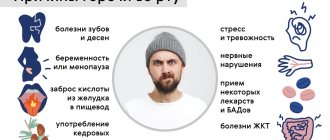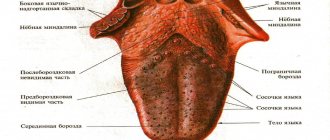Causes of bitterness in the mouth after eating
The unpleasant taste usually disappears when the cause that caused it is eliminated. Diet errors (fatty, deep-fried foods), smoking, bad teeth, poor oral hygiene, and taking certain medications are potential causes of bad taste. However, dryness and bitterness in the mouth are also symptoms of gastrointestinal diseases. Biliary dyskinesia, chronic cholecystitis, cholelithiasis cause discomfort in the oral cavity. Also, the cause of a bitter taste can be diseases of the duodenum, chronic gastritis, enteritis, and colitis.
How to remove severe bitterness in the mouth and nausea? It is necessary to treat the underlying disease, the manifestations of which are these symptoms. But even after cholecystectomy, unpleasant symptoms may persist. Bitterness in the mouth after gallbladder removal is often associated with the so-called postcholecystectomy syndrome. If, despite following a diet, a bitter taste in the mouth persists for a long time after surgery, you should consult a doctor to identify the cause and prescribe appropriate therapy. The cause of bitterness in the mouth after eating can be simple overeating. In case of a large feast, you can take a tablet of an enzyme preparation (panzinorm, festal, mezim forte) during meals. But it is still advisable to adhere to the rules of a healthy diet: eat small portions 5-6 times a day, eliminate or limit the consumption of fatty and fried foods, drink more water. Then the question “how to treat bitterness in the mouth while eating” will not arise, and “bells” from the liver in the form of an unpleasant taste will not come.
Where does the bitter taste come from?
An unpleasant taste may be present constantly or appear periodically. This symptom is associated with the release of bile into the esophagus. Patients often notice a bitter taste in the mouth in the morning, especially when eating fatty foods the day before and after sleeping on the left side.
Bile is a liver secretion that is involved in digestion. The fluid flows through the ducts into the gallbladder and from there into the duodenum. Normally, bile does not flow into the esophagus, and the person feels well.
After eating certain types of food, the liver may react by producing more secretions. The volume of bile in the intestines increases, and a small part enters the esophagus, causing a bitter taste in the mouth. The same reaction occurs when using certain medications or when exposed to other factors. In any case, an unpleasant taste is a reason to consult a doctor. Only by identifying the cause of bitterness in the mouth can a person’s well-being be improved.
What to do if you have a bitter taste in your mouth and a white coating on your tongue
Some medications cause a bitter taste. These include lithium preparations, antidepressants, antibiotics, allopurinol, vitamin and mineral complexes. Bitterness in the mouth can be combined with nausea, dryness, and a white coating on the tongue. Usually, special treatment for bitterness in the mouth after taking antibiotics or other medications is not required. The unpleasant taste disappears upon completion of the course of treatment and no longer bothers you.
What should you do if you have a bitter taste in your mouth and a white coating on your tongue that persists for a long time after taking medications? Contact your doctor. It may be necessary to prescribe hepatoprotectors - drugs that restore liver function. The treatment regimen for some diseases initially includes medications that “protect” the liver. This approach is practiced when prescribing chemotherapy drugs, especially with long courses and high dosages.
Diagnostics
In order to determine the cause of sour taste in men , it is necessary to undergo a comprehensive examination, which will exclude or confirm certain diseases. Comprehensive diagnostics includes the following activities:
- esophagogastroduodenoscopy (most informative for diagnosing gastric ulcers ;
- gastric pH-metry;
- ultrasound examination of the abdominal organs, including the liver and gallbladder;
- ultrasound examination of the pancreas;
- biochemical blood test, including liver tests and assessment of pancreatic enzyme levels;
- general clinical blood test;
- assessing blood glucose levels;
- consultation with a neurologist, endocrinologist, gastroenterologist, hepatologist;
- analysis for glycosylated hemoglobin.
Other causes of bitterness in the mouth
Why there is a constant bitter taste in the mouth - possible reasons:
- smoking;
- inhalation of vapors of certain chemicals;
- dehydration;
- glossitis;
- dry mouth;
- allergy;
- salivary gland infections;
- lack of zinc and vitamin B12;
- nasal polyps;
- autoimmune diseases such as Sjögren's syndrome and Bell's palsy;
- mouth breathing;
- inflammatory diseases of the upper respiratory tract;
- injuries to the head, mouth, nose;
- braces;
- Radiation therapy to the neck or head.
Bitterness in the mouth in the early stages of pregnancy may be associated with changes in hormonal levels, attacks of nausea and vomiting (toxicosis). Read more about this symptom on our website.
3. Symptoms and diagnosis
Bitterness in the mouth is the only and isolated symptom very rarely (in fact, never). It is extremely important to monitor and then inform the doctor about what other symptoms the bitter taste is combined with, and on what situations and factors its appearance depends. Thus, accompanying symptoms most often include heartburn, belching, nausea and vomiting, all kinds of pain and discomfort in the abdominal area, flatulence, fever, as well as that same “general malaise.” Factor-conditions can be the time of day (for example, bitterness in the morning, characteristic of hepato- and cholecystopathology), food intake in general and certain foods in particular, physical activity, regular medication intake, etc.
Bitterness in the mouth can occur sporadically, for easily explainable situational reasons (for example, food poisoning or gross abuse of fatty foods), and quickly pass without a trace. But if it appears frequently or becomes constant, you should definitely consult a doctor: timely treatment can literally be life-saving in terms of early diagnosis of, say, cancer.
It is most reasonable to start the examination with a gastroenterologist: if necessary, having ruled out “his” pathology and suggesting the most likely “target” of the lesion, he will certainly refer the patient to the appropriate specialized specialist.
It is impossible to indicate the standard or most typical diagnostic methods in this case: everything is determined by the specific clinical case. Depending on the situation, you may need almost any combination of methods from the rich arsenal of modern diagnostics: radiography, endoscopy, ultrasound and tomography, laboratory analyzes of biological fluids (clinical, bacteriological, biochemical, immunological, etc.).
About our clinic Chistye Prudy metro station Medintercom page!
How to get rid of bitterness in your mouth
If the bitterness and unpleasant taste are not caused by pathologies of the gastrointestinal tract and other diseases, then you can “fight” them yourself:
- Maintain good oral hygiene. You need to brush your gums and tongue, not just your teeth. Add a small amount of baking soda to your toothbrush before applying toothpaste. Brushing your teeth and tongue should take at least two and a half minutes. Remember to brush your teeth twice a day. Use dental floss and a tongue scraper and rinse your mouth regularly;
- eat more citrus fruits, drink orange and lemon juices. The acid stimulates the production of saliva and eliminates the bitter taste in the mouth;
- Visit your dentist regularly for preventive examinations and dental plaque removal;
- stop smoking;
- drink enough water;
- limit your consumption of fatty and spicy foods. Eat slowly, chewing your food thoroughly.
If you follow all these rules, and the bitterness in your mouth persists, consult a doctor, as the cause of unpleasant symptoms may be endocrine diseases, mental disorders, and pathologies of the gastrointestinal tract.
Related services: Consultation with a pediatrician Consultation with a family doctor
Treatment
To get rid of the symptoms that bother you, you will first need to adjust your diet - avoid sour, spicy and too fatty foods, juices and sodas, prefer steamed and baked to fried. These are general recommendations. The doctor may also recommend a more restrictive diet depending on the identified disease.
Medications are prescribed by a doctor.
These can be hepatoprotectors, enzyme-containing drugs, antacids, etc. You should not prescribe medications on your own without consulting a doctor - you may be mistaken about the cause of the alarming symptoms and aggravate the situation. If you don’t have time to visit a doctor, call a therapist at home by phone: +7 (495) 730-21-31
Hepatitis
Liver cells are responsible for the production of bile necessary for the normal digestion process. When they are destroyed due to hepatitis, this function becomes noticeably more complicated. The patient complains of bitterness in the throat and burning in the mouth. Other symptoms of this disease of an autoimmune or infectious nature are:
- belching,
- painful sensations in the right side, radiating under the shoulder blade,
- nausea,
- loss of appetite and sudden weight loss,
- irritation on the skin,
- jaundice.
When the first signs of liver problems appear, it is important to immediately undergo a diagnosis in order to avoid the development of such dangerous consequences as liver cirrhosis, coma, and cancer.
The presence of the disease can be determined using a blood test, ultrasound examination of the liver and spleen, which significantly increase in size in an inflamed state.
Hepatitis in the acute stage is treated inpatiently. The patient is recommended:
- bed rest,
- a gentle diet,
- quitting smoking and alcohol,
- complexes of vitamins and minerals to support immunity,
- a course of drugs aimed at reducing intoxication of the body,
- means for protecting the liver from the effects of pathogenic microorganisms,
- daily enema.
Why there is an iron taste in the mouth: reasons not related to disease
If you notice an iron taste in your mouth, you should not immediately panic: there is a possibility that the unpleasant sensation is not associated with diseases.
It may appear due to:
- drinking mineral water with salts (often this product is enriched to compensate for iron deficiency in the body);
- drinking low quality drinking water (for example, supplied to the home through old rusty pipes);
- tongue piercing (the sensation appears as a result of the metal reacting with certain foods);
- using cast iron and aluminum cookware when preparing and eating food.
Metal taste as a symptom of oral diseases
Patients with gum problems often complain of a strong metallic taste that occurs repeatedly throughout the day. The most popular diseases that provoke such unpleasant sensations include periodontitis and gingivitis, which are accompanied by bleeding gums, and many people describe the taste of blood as metallic. It usually appears during brushing your teeth and after eating. Some patients feel as if there is a foreign body in the mouth, which causes serious inconvenience.
Loose teeth and tartar build-up can also cause a metallic taste. There is no point in trying to independently identify the causes - it is better to immediately contact a dentist.
Metal structures in the mouth
After installing braces and crowns, dentists warn patients about the possible appearance of a metallic taste - this is a normal phenomenon that should subside within a week after the procedure. If this period has passed, and discomfort still makes itself felt, the reasons may be as follows:
- allergy to metal. It is very rare, but taking an allergy test will not be superfluous. If the suspicion is confirmed, the only solution will be a complete replacement of all installed structures;
- galvanism (interaction between metals), which occurs in the case of installation of orthopedic structures made of different materials that interact with each other. If all the crowns and posts are made of the same material and the amalgam fillings are replaced, the problem will disappear.
If you have metal dentures or implants, an iron taste may become noticeable after consuming acidic foods and drinks. Accordingly, the presence of piercings on the tongue or lips can also cause a similar effect.
Microflora imbalance
Bifidobacteria and lactobacilli of the intestine are involved in the synthesis of vitamins, suppress staphylococci, E. coli, Shigella, and fungi. Participate in the digestion of food, prevent the development of gastrointestinal diseases, increase the body's defenses and metabolism.
A healthy body has a balance of “good” and pathogenic microflora. It is disrupted by unhealthy diet, vitamin deficiency, strict diets, stress, overwork, infections, poisoning, treatment with antibiotics, hormonal drugs, immunosuppressants, and gastrointestinal surgery.
- Why there is a lump in the throat and how to get rid of it
An imbalance is indicated by a decrease in appetite, increased gas formation, constipation or frequent loose stools, belching, bad breath, and poor digestion of food. Vitamin deficiency is indicated by dry skin, cracks in the corners of the mouth, brittle and dull hair, and brittle nails.
Inflammation of the large (colitis) or small intestine (enteritis) is the cause of bitterness in the mouth. Severe stomach pain, nausea, belching and heartburn are signs of gastritis. Pathogenic bacteria release a lot of toxins that penetrate the blood, burden the excretory system, and increase the temperature.
Inflammation of the colon (colitis) disrupts its function. Unstable stool, rumbling and pain in the lower abdomen, increased gas formation. Going to the toilet does not always give results. Weakness, indifference, disturbed sleep. Feels nauseous and may vomit. Belching, bitterness in the mouth. Due to pain after eating, eating infrequently is the reason for weight loss. Signs of vitamin deficiency (hypovitaminosis).
The disease is caused by an unbalanced diet, a predominance of carbohydrates, spices, a deficiency of vitamins, microelements, plant fiber, long-term use of laxatives, antibiotics, drugs for the treatment of psychotic disorders, relieving anxiety and fear, abuse of cleansing enemas and suppositories.
The cause of bitterness in the mouth is Shigella and Salmonella. The development of colitis is promoted by enteroviruses, the herpes virus, an imbalance of microflora, and injury to the intestinal mucosa by allergens to specific foods.
Metallic taste in the mouth of people of different sexes
A number of reasons that cause the sensation of metal are divided by gender.
For men who work in mining or in industries that use heavy metals, an iron taste may appear during each shift and disappear after the end of the shift. Long-term wearing of massive metal objects (bracelets, watches) also leads to a similar result, since during prolonged contact with the skin the concentration of ions entering the blood through the pores becomes too high.
Women may experience a metallic taste due to:
- pregnancy. Many expectant mothers note that a metallic taste periodically appears during pregnancy. Why does this happen? Firstly, the matter may be a lack of microelements and vitamins, and secondly, changes in hormonal levels and malfunctions in the functioning of receptors that recognize taste can be to blame;
- the use of weight loss drugs and various biological additives, which often leads to poisoning due to incorrect dosages and the desire to quickly get the most pronounced result possible;
- insufficient amount of fluid consumed (women resort to this remedy to lose weight and get rid of swelling). A metallic taste is one of the signs of dehydration.
It is best to start combating this not very pleasant feeling by visiting a doctor who will prescribe the necessary tests and examinations. Otherwise, you can look for reasons on your own and continue to experience discomfort regularly for a very long time.









